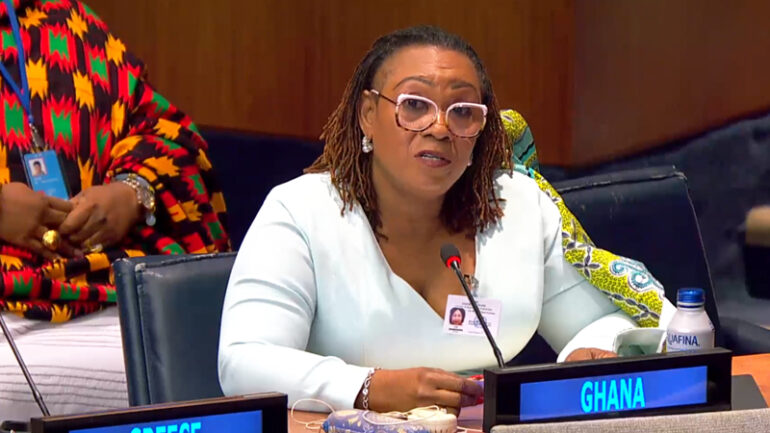The sixty-eighth session of the Commission on the Status of Women (CSW68)

- Posted by admin
- Posted in News, Statement & Remarks, UN News
Hon. Mavis Hawa Koomson
Minister Temporary Responsible for
Gender, Children and Social Protection.
United Nations, New York
March 12, 2024
“ACCELERATING THE ACHIEVEMENT OF GENDER EQUALITY AND THE EMPOWERMENT OF ALL WOMEN AND GIRLS BY ADDRESSING POVERTY AND STRENGTHENING INSTITUTIONS AND FINANCING WITH A GENDER PERSPECTIVE”
Mr. Chair, Excellencies, Distinguished Delegates,
I am honored to address the sixty-eighth session of the Commission on the Status of Women. Ghana aligns itself with the statement delivered by Uganda on behalf of the African Group.
Mr. Chair, the focus of this year’s Session, strengthening institutions to finance and achieve gender equality and the empowerment of women and girls, deeply resonates with Ghana’s commitments and actions. The importance of effective gender financing and budgeting in national development cannot be overstated.
Under the leadership of His Excellency Nana Addo Dankwa Akufo-Addo, the President of the Republic of Ghana and the African Union Gender Champion, Ghana has shown strong commitment to promoting gender equality and women’s empowerment. This commitment is evident in our policies, interventions, and programmes, and have aimed at integrating gender concerns and inclusivity into our socio-economic development.
Supported by strong policies and legislation like the Revised National Gender Policy and the Draft Affirmative Action Plan, Ghana is making strides in gender equality and empowerment. The updated National Gender Policy, inclusive of financing sources to strengthen gender-focused institutions, is one of the innovative approaches Ghana has pursued.
Furthermore, Ghana has implemented key programmes such as the Livelihood Empowerment Against Poverty (LEAP) programme, the Ghana School Feeding Programme, and the Free Senior High School initiative. These programmes have not only aimed at empowering women and girls but also at creating equal job opportunities and a systemic response to alleviate poverty in all its multidimensional forms.
In our efforts to eliminate violence against women and girls, Ghana has taken comprehensive and robust actions over the years, including the establishment of the Ministry of Gender, Children, and Social Protection, the Domestic Violence and Victim Support Unit of the Ghana Police Service, and the Domestic Violence Courts. The institutional frameworks which have been backed by high priority national programmes exemplify the Government of Ghana’s determination to eradicate violence against women and girls.
To ensure an all-of-society approach on gender matters, Ghana has prioritised collaboration with traditional authorities, faith-based leaders, civil society, and other stakeholders to promote positive socio-cultural norms and gender equality. This collaboration has resulted in a national framework to address gender inequalities and harmful cultural practices, significantly advancing gender equality, equity, and empowerment.
Mr. Chair, based on our experiences, Ghana proposes the following five (5) strategic directions for the global community:
• Establishing and fortifying social protection systems for vulnerable women and girls;
• Adopting gender responsive budgeting processes;
• Ensuring universal access to quality education and healthcare for women and girls;
• Enacting and enforcing legislative reforms to eradicate gender bias; and
• Fostering global partnerships to share best practices and resources in gender equality initiatives.
In closing, Ghana reiterates its commitment to the economic, social, and health empowerment of women and girls, and remains resolved in working towards a world where gender equality is a reality. The insights from this session are invaluable, shaping our collective efforts to empower women and girls globally.
I thank you for your attention.
